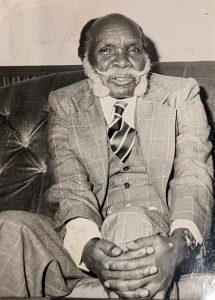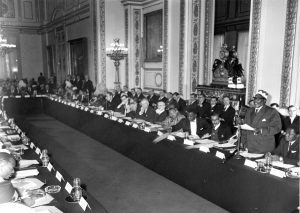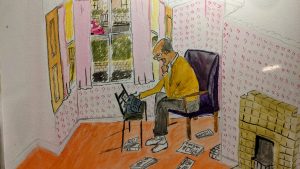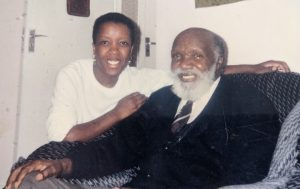
Unpublished manuscripts of Kenyan journalist Henry Muoria
The Royal Commonwealth Society Collection is thrilled to report that it has been donated the unpublished manuscripts of the important Kenyan journalist and writer Henry Muoria through the great generosity of his daughter Wangari Muoria-Sal. We are also grateful to Wangari for the photographs and memory sketch of her father at work which accompany the blogpost.
Mwaniki Muoria was born in 1914 in Kabete, South Kikuyu, the son of agricultural small holders Mwaniki wa Muoria and Wambui wa Mbari, and took the Christian name Henry when baptised at the age of 16. Muoria entered a mission school, supporting his studies through the sale of vegetables his mother grew on the family’s land. Muoria joined the British East African Railways, working first as a signalman, and then as a guard and deputy stationmaster. He married a Christian, Elizabeth Thogori, in 1933.
During his travels, Muoria observed the poor living conditions and educational opportunities available to Kenyans and spent much time reading and reflecting. He studied journalism through a British correspondence course. In the early 1940s, he left the railways and embarked upon a career as a writer, publishing two influential political pamphlets. ‘Muturire wa Kiriu’ (‘What It Takes to Live Sociably’) was written in partnership with his second wife, Judith Nyamurwa, whom he married following the divorce of his first wife in 1945. ‘Tungika Atia Iiya Witu?’ (‘What Shall We Do, Our People?’) was a reflection upon contemporary ethics, philosophy and politics. In 1945 Muoria founded the newspaper, ‘Mumenyereri’ (‘The Guardian’) published at first in both Kikuyu and English, but soon after in Kikuyu alone, which gained a wide readership expressing his opposition to the colonial government. In the later 1940s he also established his own printing press and translated pamphlets from English into Kikuyu and Swahili. He served as general secretary of the pre-eminent African nationalist organisation and advised the colonial government upon the media and the press. In 1948 he married Ruth Nuna Kinyori.
Alongside Muoria’s own work to achieve progress for Africans and a free, independent and democratic Kenya, he supported the nationalist leader Jomo Kenyatta, who had returned in 1946, and would become the new nation’s first president. Muoria reported upon Kenyatta’s tours mobilising support for African unity and resistance to the colonial regime, quoting his speeches and recording the reaction of audiences in ‘Mumenyereri.’ In 1948 Muoria collected these articles, which were printed in two pamphlets, ‘Guka kwa Njamba Iitu Nene Jomo Kenyatta’ (‘The Homecoming of Our Great Hero Kenyatta’) and ‘Kenyatta ni Muigwithania Witu’ (‘Kenyatta Is Our Reconciler’).
Muoria was in Britain seeking new technology for his printing press in 1952 when the colonial government declared the Emergency in response to the Mau Mau movement. While sharing the Mau Mau’s wider goals of the restitution of land and full rights for Africans in an independent Kenya, Muoria did not support it. He was advised by African politicians that he risked internment if he returned to Kenya because of his opposition to the colonial regime.
Muoria remained in Britain until his death in 1997, continuing to write while working, raising a large family and caring for his wife Ruth when she became ill. He published an autobiography, ‘I, The Gikuyu and the White Fury’ in 1994. The nine unpublished manuscripts donated to the RCS (RCMS 405) were written between 1944 and the late 1980s, and include imaginative prose as well and moral and political essays. Altogether they express the wide range of Muoria’s experience and insight, reflecting upon his life, faith, identity, and a seminal period of Kenya’s political history.





Very good Article and drawings off The Late Henry Muoria……
Great scholar indeed
Well, I had seen someones discourse on colonial era Kenyan writers who mentioned Bw.Muoria haven’t come across any of his writings. Would love to. Kind regards.
Will these be available online?